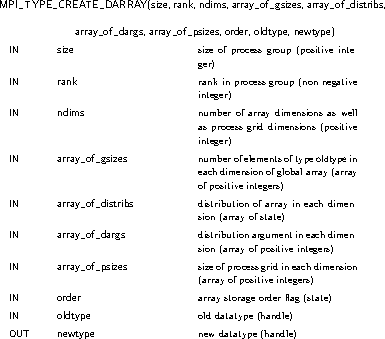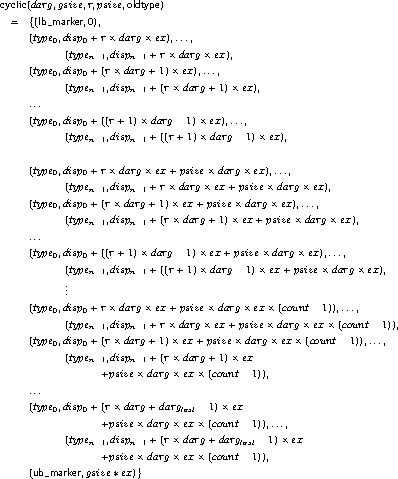
The distributed array type constructor supports HPF-like [42] data distributions. However, unlike in HPF, the storage order may be specified for C arrays as well as for Fortran arrays.
Advice to users.
One can create an HPF-like file view using this type constructor
as follows.
Complementary filetypes are created by having every process of a group
call this constructor with identical arguments
(with the exception of rank which should be set appropriately).
These filetypes (along with identical disp and etype)
are then used to define the view (via MPI_FILE_SET_VIEW),
see MPI I/O, especially Section Definitions
and Section File Views
.
Using this view,
a collective data access operation (with identical offsets)
will yield an HPF-like distribution pattern.
( End of advice to users.)

int MPI_Type_create_darray(int size, int rank, int ndims, const int array_of_gsizes[], const int array_of_distribs[], const int array_of_dargs[], const int array_of_psizes[], int order, MPI_Datatype oldtype, MPI_Datatype *newtype)
MPI_Type_create_darray(size, rank, ndims, array_of_gsizes, array_of_distribs, array_of_dargs, array_of_psizes, order, oldtype, newtype, ierror)
INTEGER, INTENT(IN) :: size, rank, ndims, array_of_gsizes(ndims),
array_of_distribs(ndims), array_of_dargs(ndims),
array_of_psizes(ndims), order
TYPE(MPI_Datatype), INTENT(IN) :: oldtype
TYPE(MPI_Datatype), INTENT(OUT) :: newtype
INTEGER, OPTIONAL, INTENT(OUT) :: ierror
MPI_TYPE_CREATE_DARRAY(SIZE, RANK, NDIMS, ARRAY_OF_GSIZES, ARRAY_OF_DISTRIBS, ARRAY_OF_DARGS, ARRAY_OF_PSIZES, ORDER, OLDTYPE, NEWTYPE, IERROR)
INTEGER SIZE, RANK, NDIMS, ARRAY_OF_GSIZES(*), ARRAY_OF_DISTRIBS(*),
ARRAY_OF_DARGS(*), ARRAY_OF_PSIZES(*), ORDER, OLDTYPE, NEWTYPE,
IERROR
MPI_TYPE_CREATE_DARRAY can be used to generate
the datatypes corresponding to the distribution
of an ndims-dimensional array of oldtype elements
onto
an ndims-dimensional grid of logical processes.
Unused dimensions of array_of_psizes should be set to 1.
(See Example Distributed Array Datatype Constructor
.)
For a call to MPI_TYPE_CREATE_DARRAY to be correct,
the equation prodi=0ndims-1 array_of_psizes[i] = size
must be satisfied.
The ordering of processes in the process grid is assumed to be
row-major, as in the case of virtual Cartesian process topologies.
Advice to users.
For both Fortran and C arrays, the ordering of processes in the
process grid is assumed to be row-major. This is consistent with the
ordering used in virtual Cartesian process topologies in
MPI.
To create such virtual process topologies, or to find the coordinates
of a process in the process grid, etc., users may use the corresponding
process topology functions,
see Chapter Process Topologies
.
( End of advice to users.)
Each dimension of the array
can be
distributed in one of three ways:
For example, the HPF layout ARRAY(CYCLIC(15)) corresponds to MPI_DISTRIBUTE_CYCLIC with a distribution argument of 15, and the HPF layout ARRAY(BLOCK) corresponds to MPI_DISTRIBUTE_BLOCK with a distribution argument of MPI_DISTRIBUTE_DFLT_DARG.
The order argument is used as in MPI_TYPE_CREATE_SUBARRAY to specify the storage order. Therefore, arrays described by this type constructor may be stored in Fortran (column-major) or C (row-major) order. Valid values for order are MPI_ORDER_FORTRAN and MPI_ORDER_C.
This routine creates a new MPI datatype with a typemap defined in terms of a function called ``cyclic()'' (see below).
Without loss of generality, it suffices to define the typemap for the MPI_DISTRIBUTE_CYCLIC case where MPI_DISTRIBUTE_DFLT_DARG is not used.
MPI_DISTRIBUTE_BLOCK and MPI_DISTRIBUTE_NONE can be reduced to the MPI_DISTRIBUTE_CYCLIC case for dimension i as follows.
MPI_DISTRIBUTE_BLOCK with array_of_dargs[i] equal to MPI_DISTRIBUTE_DFLT_DARG is equivalent to MPI_DISTRIBUTE_CYCLIC with array_of_dargs[i] set to
(mpiargarray_of_gsizes[i] + mpiargarray_of_psizes[i] - 1) / mpiargarray_of_psizes[i].
If array_of_dargs[i] is not MPI_DISTRIBUTE_DFLT_DARG, then MPI_DISTRIBUTE_BLOCK and MPI_DISTRIBUTE_CYCLIC are equivalent.
MPI_DISTRIBUTE_NONE is equivalent to MPI_DISTRIBUTE_CYCLIC with array_of_dargs[i] set to array_of_gsizes[i].
Finally, MPI_DISTRIBUTE_CYCLIC with array_of_dargs[i] equal to MPI_DISTRIBUTE_DFLT_DARG is equivalent to MPI_DISTRIBUTE_CYCLIC with array_of_dargs[i] set to 1.
For MPI_ORDER_FORTRAN, an ndims-dimensional distributed array ( newtype) is defined by the following code fragment:
oldtypes[0] = oldtype;
for (i = 0; i < ndims; i++) {
oldtypes[i+1] = cyclic(array_of_dargs[i],
array_of_gsizes[i],
r[i],
array_of_psizes[i],
oldtypes[i]);
}
newtype = oldtypes[ndims];
For MPI_ORDER_C, the code is:
oldtypes[0] = oldtype;
for (i = 0; i < ndims; i++) {
oldtypes[i + 1] = cyclic(array_of_dargs[ndims - i - 1],
array_of_gsizes[ndims - i - 1],
r[ndims - i - 1],
array_of_psizes[ndims - i - 1],
oldtypes[i]);
}
newtype = oldtypes[ndims];
where r[i] is the position of the process (with rank rank)
in the process grid at dimension i.
The values of r[i] are given by the following code fragment:
t_rank = rank;
t_size = 1;
for (i = 0; i < ndims; i++)
t_size *= array_of_psizes[i];
for (i = 0; i < ndims; i++) {
t_size = t_size / array_of_psizes[i];
r[i] = t_rank / t_size;
t_rank = t_rank % t_size;
}
Let the typemap of oldtype have the form:
{(type0,disp0),(type1,disp1),...,(typen-1,dispn-1)}
where typei is a predefined MPI datatype, and let ex be the
extent of oldtype.
The following function uses the conceptual datatypes lb_marker
and ub_marker, see Section Lower-Bound and Upper-Bound Markers
for details.
Given the above, the function cyclic() is defined as follows:

where count is defined by this code fragment:
nblocks = (gsize + (darg - 1)) / darg;
count = nblocks / psize;
left_over = nblocks - count * psize;
if (r < left_over)
count = count + 1;
Here, nblocks is the number of blocks that must be
distributed among the processors.
Finally, darglast is defined by this code fragment:
if ((num_in_last_cyclic = gsize % (psize * darg)) == 0)
darg_last = darg;
else {
darg_last = num_in_last_cyclic - darg * r;
if (darg_last > darg)
darg_last = darg;
if (darg_last <= 0)
darg_last = darg;
}
<oldtype> FILEARRAY(100, 200, 300) !HPF$ PROCESSORS PROCESSES(2, 3) !HPF$ DISTRIBUTE FILEARRAY(CYCLIC(10), *, BLOCK) ONTO PROCESSESThis can be achieved by the following Fortran code, assuming there will be six processes attached to the run:
ndims = 3
array_of_gsizes(1) = 100
array_of_distribs(1) = MPI_DISTRIBUTE_CYCLIC
array_of_dargs(1) = 10
array_of_gsizes(2) = 200
array_of_distribs(2) = MPI_DISTRIBUTE_NONE
array_of_dargs(2) = 0
array_of_gsizes(3) = 300
array_of_distribs(3) = MPI_DISTRIBUTE_BLOCK
array_of_dargs(3) = MPI_DISTRIBUTE_DFLT_DARG
array_of_psizes(1) = 2
array_of_psizes(2) = 1
array_of_psizes(3) = 3
call MPI_COMM_SIZE(MPI_COMM_WORLD, size, ierr)
call MPI_COMM_RANK(MPI_COMM_WORLD, rank, ierr)
call MPI_TYPE_CREATE_DARRAY(size, rank, ndims, array_of_gsizes, &
array_of_distribs, array_of_dargs, array_of_psizes, &
MPI_ORDER_FORTRAN, oldtype, newtype, ierr)